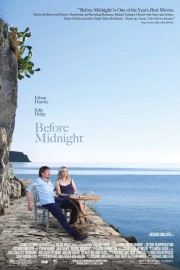Before Midnight
It’s almost underselling it to call Richard Linklater’s “Before” series “special.” When people look back at the past 20 years in film, I think Linklater’s trilogy with Ethan Hawke and Julie Delpy will stand not only as some of the finest cinema of this time period, but one of the most important franchises of all-time.
To recap: in 1995, Linklater released his third film, “Before Sunrise.” Co-written by Kim Krizan, the film followed Hawke’s Jesse and Delpy’s Celine off of a train, and into the streets of Venice, where they formed an instant connection. Their long night together ended back at the train station, and with a promise to reunite in nine months. The film, though well-reviewed, was hardly a hit. And there, the story should have ended…
…only it didn’t. After the three brought Jesse and Celine back together in Linklater’s great philosophical study, “Waking Life,” the director and actors were inspired to return to the characters for another feature film. In 2004, we got “Before Sunset,” wherein Jesse and Celine come together in Paris, nine years after that night in Venice. That film, shot in real time, was instantly beloved not only by fans of the first film, but also people who hadn’t seen the original, and “Sunset” became an independent hit that summer, and netted the director and actors a Best Adapted Screenplay Oscar nomination.
Nine years later, right on schedule, we are treated to “Before Midnight,” and it continues the series’s tradition of smarter, bolder storytelling. The actors are older, with more life experience, which they bring to the forefront of their performances, and Linklater is more confident than ever in his story, as Jesse and Celine have been together since their reunion in Paris nine years ago. They have two girls together, and are vacationing in Greece for the summer with friends, and Jesse’s son from his previous marriage, which had come crashing down after Paris, when he missed his plane for Celine. It’s their last day in Greece, and Jesse has had to say goodbye to his son, who went on the long flight back to Chicago and his ex-wife. Jesse is sullen on the ride back, and regrets having missed what he has of his son’s youth. He idly brings up the thought of moving to the States so that he doesn’t miss his son’s high school years, which begins a tense afternoon and evening between Celine and he that threatens the life they’ve put together for themselves.
One of the great things cinema allows us to see in sequels– the best ones, at least –is how the main characters evolve over time. They have experiences that motivate them; they make mistakes; and they grow right in front of our eyes. Of course, we know that this is rarely the case in modern Hollywood, which is so rooted in formula and artistic stasis at this point that it’s hard to imagine a studio head even considering a greenlight for this film. Thankfully, Linklater and his leads perservere, and the result is one of the most artistically rich three-quels (if not THE richest) in movie history. We feel a real sense of tension between Jesse and Celine, between his youthful vigor and her more pragmatic wisdom; between his longing for a more rewarding relationship with his son, and her more clear-headed view of how rewarding it already is, even if it’s coupled with real anxiety about whether they remain as capatable as they were in their youth. As with any great relationship, familarity breeds not contempt but understanding and acceptance, and we see where both of these two are coming from simply, and profoundly, and we empathize. Are they still together at the end of the movie? I won’t say, except that, as they showed in “Before Sunset,” Linklater, Hawke, and Delpy (who deserve to repeat their prior success with Oscar, and then some) know how to deliver an unexpected, and emotionally-satisfying, conclusion to what we’ve seen before. Will we get to see them again in nine years? I can only hope so.










